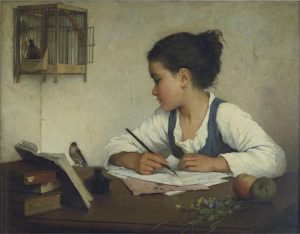National Novel Writing Month is upon us. It’s an international month-long event in which
folks pound out the first draft of a novel, posting the progress, getting lots of cheers every step of the way, and exchanging writing advice. Lots of friends will be doing it, many of them regular participants.
Alas, or perhaps not alas, not me.
I always have specific reasons. This year, I’m very close to finishing a revision of an on-spec novel that I’ve been working on for some years now, in the time gaps between contracted projects. I’m on the brink of the climactic scene, which spans 4 or 5 chapters and brings together everything that has gone before with a bang and a few nifty twists. If I nail it, the book works. Needless to say, this book not only haunts my every waking hour but has inveigled itself into my dreams. Not the story, mind you — the writing and revising of it.
I began this book back in 2013 on a lark, one of those what-if ideas that just takes off on its own. It had been a long time since I’d embarked upon an unoutlined, unplanned, seat-of-the-pants story, especially one of novel length. I had not realized how much my creative spirit needed what I call taking a flying leap off the cliff of reality. Working on my netbook, I continued the draft while taking care of my best friend as she died of cancer. The story, with all its open possibilities — and it had quite a few surprises for me — gave me an emotional refuge so that I could return, “batteries recharged,” to be present with my friend and her family.
Am I going to set this aside and lose all the momentum I’ve regained during this revision?
Don’t get me wrong. I think NaNoWriMo can be a wonderful thing. I’ve done writing challenges before, way back when, and learned a lot about JustKeepWritingNoMatterWhat. I also think I could use a reminder course from time to time, when I slog through a period of stopping every 5 minutes for another round of online Scrabble. The community support, the exhilaration posting each day’s progress, is wonderful.
But every writer works in different ways, and I feel my hackles rise — not a lot, just a tad — at the “everyone’s doing this, don’t be left out” feeling. Maybe I’m creating that in my own mind, or it’s an echo of being in the “out” crowd during my formative high school years. I need to remind myself to pay attention to what works for me, and that posting daily word counts does not fit most of the time. For me, daydreaming that leads to a deeper story, a connection between characters, a surprising turn of events, is time well spent. Sometimes, a single insight means a solid day’s work, even if no words appear on the page. Other times, if I force that daily page or word count, I end up with something superficial and green, which is not necessarily bad as much of the real work for me happens in revision. But by working well, no matter how slowly, I can nurture that depth as I go along and be sensitive to the openings and connections that I might miss in my haste.
If you’re doing NaNoWriMo, more power to you, and may its many gifts be yours! But if not, join me in writing “deep and true and slow.”


 and general cheering one another on can be awesome. But it’s not for everyone.
and general cheering one another on can be awesome. But it’s not for everyone. In which I interview myself on National Novel Writing Month (NaNoWriMo)
In which I interview myself on National Novel Writing Month (NaNoWriMo)